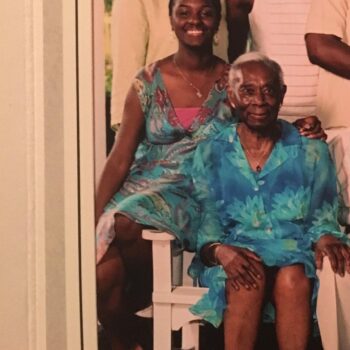Elizabeth DeHaan

If you are an older child and have a loved one with Alzheimer’s, do your research. For a period, I actively researched Alzheimer’s and watched specials on it. These practices helped me understand what was happening. If you better understand the disease, your relationship with your loved one will likely improve.
March 16th, 2018
Elizabeth DeHaan is a writer, who lost her grandmother to Alzheimer’s disease.
It started with my grandmother forgetting where she placed small items such as change or her glasses. She often relied on me to help her find her things, but after a while, we noticed these requests became more frequent. I was 11 years old when my grandmother was diagnosed with Alzheimer’s in 2001, and watching her lose everything that made her who she was, including the ability to speak, feed herself and recognize me was extremely painful. My grandmother probably had Alzheimer’s for much longer than we thought, but we assumed her forgetfulness was just part of the aging process and didn’t look for signs. My mother and I were living with my grandparents at the time. Because I was also raised by my grandparents, everything that I am today, is in part because of my grandmother. My grandmother passed away from Alzheimer’s over ten years ago.
My mother and I moved the same year that my grandmother was diagnosed, and my grandmother came to stay with us so that she could continue to help raise me. However, once the disease progressed, it was my mother who started taking care of my grandmother. For a while, I resented my grandmother because I felt that it was too hard on my mother to take care of both of us. Deep down, I knew having this disease was not her fault. Eventually, I resented Alzheimer’s for stealing my loved one from me and for placing the burden on the caregiver. It’s difficult to remember that your loved one is still the same person. At times, it feels like you’re living with a stranger.
As a child, I wasn’t responsible for being a caregiver, but I did help my mother with chores. Now that I’m older and can look back on my experience, I would advise parents who are caregivers to discuss the situation with your children so that they can process everything, even if they are not old enough to understand what is happening. Prepare them for what they may see or experience as the disease progressively gets worse. Remind them that their loved one’s behavior may vary from day to day. Help them understand that your time may be split between caring for them and caring for your loved one. Find ways that your children can participate in caring for your loved one. Encourage them to read with their grandparent or to look at photographs with them. Remember that although you’re a parent and you’re mourning the loss of your parent, your children are mourning the loss of their grandparent. Don’t feel bad to ask your spouse, children or a temporary caregiver for a break. No one is a superhero.
I would also remind children who have a loved one with Alzheimer’s that your loved one may ask the same question twenty seconds after you just answered it or he or she may fixate on a topic for the entire day. However, try to be patient and put yourself in your loved one’s shoes because he or she is likely going through a difficult experience. Even though your loved ones may not remember your name, they still love you, and being patient will reassure them. Get to know your grandparent or loved one, especially if you are older. Ask about his or her family history to learn more about your loved one’s parents or grandparents and where you came from. Sometimes, Alzheimer’s patients remember their past the most clearly, so try to listen or show them photographs to help bring these memories back. For example, my grandmother often talked about her father and how much she loved him. Once these memories are gone, they’re not easy to get back. Do your research. For a period, I actively researched Alzheimer’s and watched specials on it. This helped me understand what was happening. If you better understand the disease, your relationship with your loved one will likely improve.
If you are diagnosed with Alzheimer’s, try not to blame yourself because Alzheimer’s is not something that you caused. There is nothing you could have done. If possible, prepare yourself and your finances for what the future may hold.
Looking back, I can now say that I am grateful for the time that I had with my grandmother growing up. After watching her experience, I learned that life doesn’t always go the way you planned. Try to make memories with your loved ones while you can because they may not be here forever.